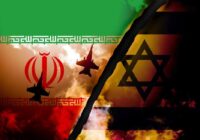The conflicts in Syria, Iraq and Yemen cannot be resolved unless Iran is at the negotiating table.
For decades, consecutive US administrations pursued a foreign policy in the Middle East designed to “contain” the Islamic Republic of Iran. However, the signing of the Joint Comprehensive Plan of Action by the P5+1 and Iran in June has opened the door for the West and the Iranians to address regional security issues within the framework of the US-Iran détente.
Despite October’s conference in Vienna having failed to achieve a breakthrough political settlement to the Syrian crisis, the engagement of American and Iranian diplomats at the talks on Syria was indicative of shifting fault lines in the Middle East’s grander geopolitical order.
Common Ground
The rise of the “Islamic State” (IS) in Iraq and Syria has encouraged both Washington and Tehran to find greater common ground, and it has fostered a growing interest on the part of Western and Iranian officials in exploring a more open relationship to address shared security concerns.
At an early stage, the Syrian crisis became another battleground in the rivalry between the Iranian-led so-called “axis of resistance” (Iran, Iraq, Syria and Hezbollah in Lebanon) on one side, and the US-backed “axis of moderation” (the Gulf Cooperation Council and other pro-Western Sunni Arab nations) on the other. The Syrian Baathist regime, Tehran’s vital strategic ally, has long served a pivotal role in enhancing Iran’s strategic clout in the Middle East. Iran’s adversaries have viewed the Syrian conflict as an opportunity to strike a blow against Tehran and the influence it has exerted via its proxies in Lebanon and Palestine such as Hezbollah, Hamas, Islamic Jihad and other non-state actors. For its part, Iran has seen the Syrian crisis as a critical battleground for retaining its influence in a strategically significant part of the Middle East.
The rise of IS, combined with Russia’s entry into the fray, has prompted Washington to question the wisdom of pursuing regime change in Syria. Although the Obama administration publicly maintains its stance that Syrian President Bashar al-Assad must relinquish power, the fact that all direct US military intervention in Syria has targeted forces fighting the Baathist order indicates that President Barack Obama’s priorities have shifted. In Washington, there appears a begrudging and unstated acknowledgement that Assad may indeed be the lesser of evils—and certainly less of a threat to US national security.
Even prior to the Islamic State’s meteoric rise to power, the emergence of other Islamist extremist factions within the Syrian opposition contributed to Washington’s reluctance to take more forceful military action against the regime in Damascus.
At this juncture, given that the Islamic State is the most powerful force in Syria seeking to topple Assad, there is growing concern in the West that the regime’s demise would result in the black and white flag of IS flying over Damascus. Indeed, not only would the group’s capture of the Syrian capital’s resources and infrastructure exacerbate the refugee crisis to a new level, but the struggle to contain IS more generally would suffer a catastrophic setback.
The Obama administration, therefore, seems to have reluctantly accepted that the Baathist regime is the most realistic bulwark against takfiri fighters who are unquestionably determined to conquer Damascus.
Political questions—most importantly about Assad’s future—have divided global and regional powers, preventing influential members of the international community from bridging the gulf between their differing positions on preconditions for resolving the Syrian crisis.
However, there is common cause among all the states that sent their diplomats to Austria in October. The globally-recognized urgency of defeating IS has highlighted Washington and Tehran’s common stakes in the conflict, which have led the US to reverse its previous position of not talking to Iranian officials about the Syrian crisis. Indeed, it was Moscow and Washington that invited Tehran to the Austrian capital.
The West and Iran’s overlapping interests in the Middle East’s security landscape have certainly contributed to a political environment in which officials in the US and the European Union (EU) recognized the need to resolve the nuclear issue, and pursue efforts to work with the Iranians to resolve the conflicts in Iraq, Syria and Yemen.
Saudi Concerns
Since the P5+1 and Iran signed the interim nuclear deal in late 2013, Saudi Arabia, and to various degrees some other Gulf Arab monarchies, expressed much unease with respect to a comprehensive nuclear agreement that would remove sanctions imposed on the Iranians. The possibility of Tehran one day developing a nuclear weapon was not the core of Saudi Arabia’s concerns. Rather, the underlying issue stemmed from the geopolitical implications of improved relations between Washington and Tehran.
In viewing the US, Iran and Saudi Arabia’s triangular relationship as a zero-sum game, officials in Riyadh perceive any improvement in ties between Washington and Tehran as necessarily the kingdom’s geopolitical loss. The Saudis fear that their strategic value to the US—still Saudi Arabia’s most important ally—would decline if Iran were to regain its pre-1979 role as Washington’s “cop on the beat” in the Persian Gulf.
Despite the Obama administration’s success in terms of securing Saudi Arabia’s lukewarm endorsement of the Iranian nuclear deal, the truth is that Riyadh is on a different page than Washington on a whole host of issues, including how it views Tehran’s role in the Syrian crisis.
As the Middle East’s fluid geopolitical order continues to shift, the US and Iran’s shared interests in defeating IS have prompted Washington to build on the nuclear agreement as a means of rekindling a relationship with Tehran. The Obama administration has determined that there is more to be gained than lost by opening dialogue with the Iranians who, whether the US likes or not, hold a variety of important cards in the region. Neither of the conflicts in Syria, Iraq or Yemen may be resolved without the inclusion of Iran at the table.
Since becoming president in 2013, Hassan Rouhani has sought to convince a number of the Islamic Republic’s traditional adversaries that Iran is a force for stability in the Middle East. It appears that a growing number of Western statesmen now agree with Rouhani on this point. For example, EU Foreign Policy Chief Federica Mogherini stated that the Iranian nuclear agreement could “open unprecedented possibilities of peace for the region, starting from Syria, Yemen, and Iraq.”
The resolution of Washington and Tehran’s standoff over Iran’s nuclear program has opened a critical door that is needed to reach a resolution on a range of issues in the Middle East. Iran’s inclusion in the Vienna talks was the first major indicator of how the nuclear agreement’s geopolitical reverberations may play out.
Although Iran’s supreme leader, Ayatollah Ali Khamenei, and other public figures in Tehran maintained virulent anti-US rhetoric following the nuclear agreement, the Iranian government also knows that a resolution of the conflicts in Iraq, Syria and Yemen cannot be achieved without engaging the West. Iranian diplomats would have not traveled to Vienna if that were not so.
Clearly, the US and Iran believe that their common interests in Syria are worth discussing with each other and with other international powers. The challenge will be to maintain momentum during Obama’s remaining term in office, and following the 2016 presidential election in the US.
The views expressed in this article are the author’s own and do not necessarily reflect Fair Observer’s editorial policy.
Photo Credit: US State Department / Fabio Rodrigues Pozzebom
 We bring you perspectives from around the world. Help us to inform and educate. Your donation is tax-deductible. Join over 400 people to become a donor or you could choose to be a sponsor.
We bring you perspectives from around the world. Help us to inform and educate. Your donation is tax-deductible. Join over 400 people to become a donor or you could choose to be a sponsor.
Support Fair Observer
We rely on your support for our independence, diversity and quality.
For more than 10 years, Fair Observer has been free, fair and independent. No billionaire owns us, no advertisers control us. We are a reader-supported nonprofit. Unlike many other publications, we keep our content free for readers regardless of where they live or whether they can afford to pay. We have no paywalls and no ads.
In the post-truth era of fake news, echo chambers and filter bubbles, we publish a plurality of perspectives from around the world. Anyone can publish with us, but everyone goes through a rigorous editorial process. So, you get fact-checked, well-reasoned content instead of noise.
We publish 2,500+ voices from 90+ countries. We also conduct education and training programs
on subjects ranging from digital media and journalism to writing and critical thinking. This
doesn’t come cheap. Servers, editors, trainers and web developers cost
money.
Please consider supporting us on a regular basis as a recurring donor or a
sustaining member.
Will you support FO’s journalism?
We rely on your support for our independence, diversity and quality.







